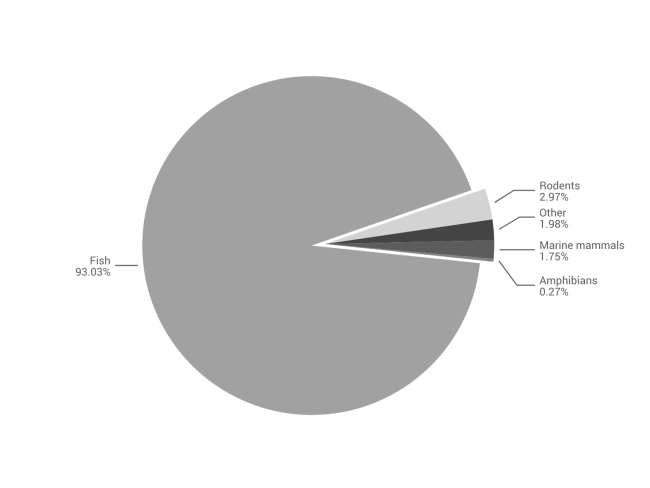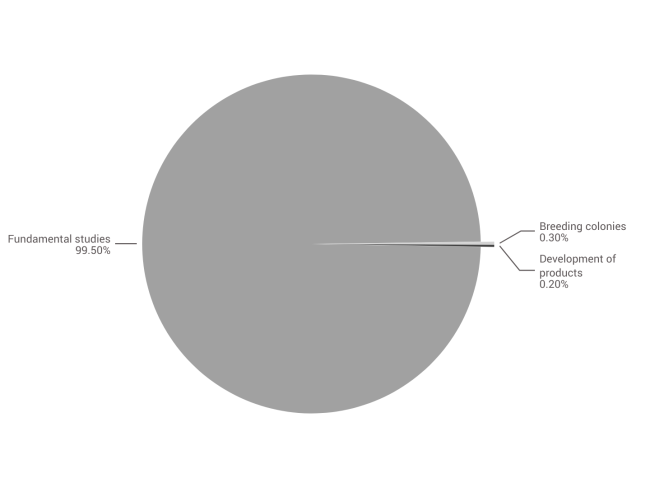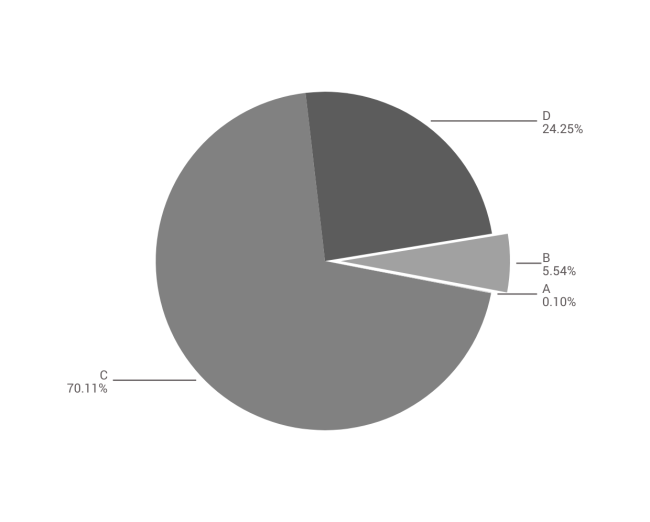Animal Care Services (ACS) at SFU is committed to providing faculty, staff and students with high quality, cost-effective research and teaching animal resources. In addition to suitable housing facilities and animal husbandry services for animals used in biomedical research, ACS provides veterinary services, personnel training and expertise in common laboratory methodologies, anaesthesia and surgical techniques for rodents, birds and fish. The ACS veterinary staff cares for all animals housed on campus, every day of the week, including holidays.
For more information please see our animal care resources for researchers.
Why are Animals Used in Research?
Globally, animal research plays an essential role in generating new fundamental scientific knowledge to help support advancing the health of humans and animals as well as the sustainability of our environment.
Research using animal models have contributed to most of the world’s major life-saving and life-changing breakthroughs. For example, biomedical research has led to discoveries that have helped combat many diseases, such as the Alzheimer’s and cancer.
Canadian federal law requires that animal models be used to make assessments on the safety and effectiveness of pharmaceuticals as well as medical procedures and other therapies before human clinical trials are approved to commence.
In addition to humans benefiting from this research and testing, many of the same drugs and treatments developed for humans are used today by veterinarians, which are helping animals live longer and healthier lives. In fact, animals are susceptible to many of the same health issues as humans, such as cancer, diabetes and heart disease.
While great advances have been made in the use of non-animal models in research, there currently are no comprehensive scientifically proven alternatives to humane animal research. When animal research is necessary, there is rigorous oversight at multiple levels from funding applications through to protocol development and study monitoring.
SFU’s Commitment to the Three R’s in Practicing Ethical Animal Research
The Three Rs (Replacement, Reduction and Refinement) established by the federal government’s Canadian Council on Animal Care (CCAC) are an integral part in the development of any research study at SFU. The university requires its researchers to use the Three Rs when preparing for any animal-based research proposals or projects.
Over the past 40 years, the Three Rs have become widely accepted ethical principles and are now embedded in the conduct of animal-based scientific research in Canada and in many countries worldwide.
SFU researchers make all conceivable efforts whenever possible to replace animals in their research with inanimate systems or non-animal models, minimize the number of animals studied, and refine husbandry and experimental procedures to minimize pain and distress for the animals involved. They also take into consideration whether working with more animals in a single study will help avoid the unnecessary participation of even more animals in a future study.
While mathematical and non-animal models are becoming increasingly sophisticated, in many circumstances they cannot replicate the complexity and unpredictability of living organisms.
Animal Research at SFU
SFU researchers’ work with animals are helping advance leading-edge research and innovations to help tackle a diverse array of health, environmental and sustainability issues impacting our world.
Some examples include:
- research into diseases such as COVID-19, cancer and Alzheimer's;
- understanding and developing treatments for concussion and spinal cord injuries;
- developing conservation and biodiversity plans for endangered and dwindling animal populations;
- and understanding how species are adapting to chemical pollution and climate change.
Management of Animal Research at SFU
The management and oversight of animal research at SFU are extensive, and occurs throughout the various stages of each research project.
Funding Agencies
All proposed projects that will use animals are peer-reviewed by a panel of subject matter experts to determine the scientific merit of the project and its methodology, if they are to receive funding from granting agencies, including the Tri-Council Agency in Canada (Natural Sciences and Engineering Research Council, Canadian Institutes of Health Research, and Social Sciences and Humanities Council).
Simon Fraser University Animal Care Committee
The Simon Fraser University Animal Care Committee (UACC) is an essential part of our animal care and research program. The committee has a duty to make informed ethical decisions with regards to the appropriateness of including animals in research and teaching. It is mandated to safeguard the welfare of animals involved in research and teaching on its campuses and at all locations where our research may occur. The UACC is responsible for ensuring that all SFU animal researchers conform to the mandatory guidelines of both SFU and the Canadian Council on Animal Care. The UACC, reports to the Vice-President, Research and Innovation Office, and its membership includes representatives from the community, a representative number of SFU departments that may or may not involve animals in research, and a veterinarian.
The UACC’s approval is required on all research and teaching activities involving vertebrate animals at SFU and its affiliated locations, including the breeding of animals, pilot projects as well as funded and unfunded research.
Canadian Council on Animal Care (CCAC)
The CCAC is the national organization responsible for setting and maintaining the highest standards for the care of animals involved in Canadian research. The Government of Canada on behalf of the public endorses CCAC standards for certification of animal care and use programs at all Canadian universities. The CCAC works to ensure that animal-based science in Canada takes place only when necessary and that the animals in studies receive optimal care according to high quality, research-informed standards.
The CCAC does a full assessment of SFU’s animal care research program every three years. SFU currently holds a CCAC Certificate of Good Animal Practice. SFU must be accredited by the CCAC to receive funding from the federal government, which funds most university research in Canada. If the university fails to comply with the CCAC’s guidelines, the council has legal authority to immediately suspend SFU’s animal care and research program.
Post-Approval monitoring
In order to ensure that researchers adhere to UACC approved protocols, ongoing projects are subjected to routine audits and annual reviews by the UACC through its post-approval monitoring program. The review team, which includes a veterinarian, scientist and community member, monitors and frequently reviews the progress of research protocols and the care of animals in those studies.
The SFU veterinarian and technical staff
SFU veterinary staff regularly attend all SFU animal research facilities to observe and advise on animal research conduct, all technical procedures as well as general husbandry and animal welfare. They are available for animal care including 24-7 emergency services. One veterinarian and 8 technical staff are involved in the care of animals at SFU.
Animal welfare laws
Federal and provincial cruelty to animals legislation is strictly complied with at SFU.
Welfare Assessments
It is the responsibility of everyone working with animals at SFU to ensure adherence to approved animal care protocols. In addition to regular veterinarian visits and external audits, SFU has a welfare incident process for identifying non-standard animal care practices. Anyone witnessing questionable animal care practices may report it anonymously or formally to the Director of Animal Care who is responsible for investigating the matter. Individuals may also report concerns to any SFU veterinarian or to the Animal Care Committee.
SFU Animal Numbers
In 2021, a total of 28,983 animals were involved in 115 research and teaching protocols at SFU.
Rodents accounted for 3 per cent of the total number of all animals involved in research at SFU last year, and 63 per cent of the mammals. Other animals involved in research were fish (93 per cent) birds (2 per cent) and amphibians (<1 per cent).
By animal type

| Animal Type | Count |
|---|---|
| Rodents | 862 |
| Fish | 26964 |
| Amphibians | 78 |
| Reptiles | 0 |
| Other small mammals | 0 |
| Other large mammals | 0 |
| Marine mammals | 506 |
| Other | 573 |
By Canadian Council on Animal Care purpose of animal use (PAU)

|
Purpose of Animal Use (PAU) |
Totals |
Percentage |
|---|---|---|
| PAU 0: Breeding colonies | 85 | 0.30 |
| PAU 1: Fundamental studies | 28351 | 99.50 |
| PAU 2: Medical studies | 0 | 0 |
| PAU 3: Regulatory testing | 0 | 0 |
| PAU 4: Development of products | 57 | 0.20 |
| PAU 5: Educational purposes | 0 | 0 |
By purpose of use
The Canadian Council on Animal Care (CCAC) divides the purposes for which we involve animals into six categories.
Purpose 0: Breeding
The number of animals in research involving breeding was 85 in 2021 compared to 377 in 2020.
Purpose 1: Basic Research
99.5 per cent per cent of animals were part of SFU’s inquiries in science disciplines that include biology, psychology, physiology and biochemistry.
Purpose 2: Medical Research
This use of animals provides treatments for diseases that improve health care outcomes for both humans and animals. In 2021 there were no animals used in this category compared to 2020 where there were 820.
Purposes 3 and 4: Regulatory Testing
Canadian law dictates that animals be research models before humans in regulatory trials for drugs and general medical products. That requirement includes vaccines and medical hardware such as stents and heart valves. SFU makes every effort to minimize the number animals used for regulatory testing. In 2021, there were no animals used in this area at SFU.
Purpose 5: Educational Purposes
Educational use of research animals is limited at SFU. All animal use in teaching at SFU must be approved by individual faculties, undergo pedagogical review, and be approved by the UACC. Where possible, vertebrate animals are replaced by invertebrates. No animals were used for educational purposes in 2021.
By Canadian Council on Animal Care category of invasiveness (CI)

| Categories of invasiveness | Total | Percentage |
|---|---|---|
| A | 85 | 0.30 |
| B | 1579 | 5.54 |
| C | 19970 | 70.11 |
| D | 6907 | 24.25 |
| E | 0 | 0 |
How were the animals involved in research?
The CCAC divides animal research into five Categories of Invasiveness (A to E). Category A includes most experiments involving tissue cultures, eggs and single-cell organisms, and most invertebrates and does not require annual reporting.
More than 75 per cent of animals involved in research at SFU in 2020 fall under categories B or C. The invasiveness ranges from little discomfort and stress to minor stress and pain. For a wide range of animals this could include observation in the wild, brief periods of restraint for tagging, taking blood samples and minor surgical biopsies under anesthesia. In Category D studies, rated for moderate to severe distress or discomfort, 24 per cent of the number of animals were involved in 2021. No animals were involved in category E studies.